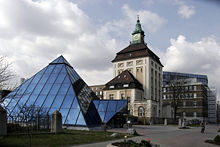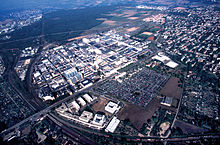- Merck KGaA
-
Not to be confused with Merck & Co., a company created from American assets of this company seized during WWI.
Merck KGaA
(EMD Chemicals in the United States and Canada)

Type Publicly traded KGaA Traded as FWB: MRK Industry Chemicals, pharmaceuticals Founded 1668 Founder(s) Friedrich Jacob Merck Headquarters Darmstadt, Germany Key people Karl-Ludwig Kley (CEO and Chairman of the executive board), Rolf Krebs (Chairman of the supervisory board) Products Liquid crystals, life science and performance chemicals, over-the-counter medicines, small molecules and biopharmaceuticals Revenue €9.291 billion (2010)[1] Operating income €1.113 billion (2010)[1] Profit €632.1 million (2010)[1] Total assets €22.39 billion (end 2010)[1] Total equity €10.37 billion (end 2010)[1] Employees 40,560 (end 2010)[1] Subsidiaries Merck Serono Website www.merck.de Merck KGaA (EMD Chemicals in the U.S. and Canada) is a German chemical and pharmaceutical company. Merck, also known as “German Merck” and “Merck Darmstadt”, was founded in Darmstadt, Germany, in 1668, making it the world's oldest operating chemical and pharmaceutical company.[2][3] The company was privately owned until going public in 1995. However, the Merck family still controls a majority (≈70%) of the company's shares.
Following World War I, Merck lost possession of its foreign sites, including the Merck & Co. subsidiary in the United States. Merck & Co., called Merck Sharp and Dohme (MSD) outside the US and Canada, is now an independent company.
Merck KGaA operates mainly in Europe, Africa, Asia, Oceania and Latin America. Since Merck & Co. holds the rights to the Merck name in the U.S. and Canada, the company operates under the umbrella brand EMD Chemicals in North America, formed from the initials of Emanuel Merck, Darmstadt.
Contents
History
The roots of Merck reach back into the 17th Century. In 1668, Friedrich Jacob Merck, an apothecary, assumed ownership of the Engel-Apotheke ("Angel Pharmacy") in Darmstadt, Germany.
In 1816, Emanuel Merck took over the pharmacy. Thanks to his scientific education he was successful in isolating and characterizing alkaloids in the pharmacy laboratory. He began the manufacture of these substances "in bulk" in 1827, touting them as a "Cabinet of Pharmaceutical and Chemical Innovations". He and his successors gradually built up a chemical-pharmaceutical factory that produced — in addition to raw materials for pharmaceutical preparations — a multitude of other chemicals and (from 1890) medicines.[4]
In 1891, Georg(e) Merck established himself in the United States and set up Merck & Co. in New York. Merck & Co. was confiscated following the First World War.[5] and set up as an independent company in the United States. Today, the US company has about 106,000 employees (Nov. 2009) in 120 countries and 31 factories worldwide. It is one of the top 5 pharmaceutical companies worldwide, larger than its German ancestor, which employs around 40,000 people in 62 countries (as of September 2010).
Failed Schering AG bid
On March 13, 2006, Merck announced a takeover bid for Schering AG, the world's largest producer of oral contraceptives. On March 23, 2006, Bayer AG made a supported offer for Schering and Merck decided to drop out of the bidding for the company.[6] Schering is not to be confused with Schering-Plough which was once part of Schering AG but was acquired by Merck & Co. in 2009.
Acquisition of Serono
In September 2006 the company announced a takeover bid of $13.2 billion for Serono SA, Switzerland's largest biotech firm. The deal included a buy-out of the Bertarelli family's 64.5% stake in Serono to be followed by a public tender offer for the remaining shares starting in November 2006.[7] The combined company has an R&D budget of approximately $1.1 billion and sales of approximately $4.6 billion. Its approximately $2 billion in sales of biologics would make it 7th among pharmaceutical/biotech companies. The new entity, Merck Serono, began operations in 2007.
Acquisition of Millipore
In 2010 Merck took over Billerica (MA) based Millipore Corporation for EUR 5.3 billion (US$ 7.2 billion).[8][9] It is now a division of Merck's business unit chemicals - Merck Millipore.
EMD Chemicals Gibbstown NJ
With the acquisition of Millipore, Merck is consolidating its US holdings and shutting down the Gibbstown facility and warehouse. Gibbstown operations will be transferred to the new Philadelphia office and Millipore headquarters.[citation needed]
Operations
Pharmaceuticals
After Wilhelm Adam Sertürner's isolation of morphine from opium in 1805, Merck pioneered (from 1827) the commercial manufacture of morphine for an expanding global market. From 1884 onwards, Merck also played role in the production and marketing of cocaine. Sigmund Freud, author of Über Coca (1884), was an enthusiastic collaborator in Merck's coca research, though the methodological sophistication of his self-experimentation studies has been challenged. Around World War I, Merck systematically patented many drugs including MDMA (ecstasy)[10] and several of its analogues, though no uses for them were given. Attention was directed at vitamins as a new product category, and Vigantol was introduced in 1927, followed by Cebion in 1934.
Following the defeat of Germany in World War II, Merck was granted permission by the military government to produce drugs, pesticides, food preservatives, reagents, and fine chemicals for laboratory use. Soon afterwards the boom commonly known as the "Wirtschaftswunder" (economic miracle) set in. For Merck this meant two-digit sales-growth figures for many years. Products of this time included corticoid preparations — for example Fortecortin, which is still used today —, the cold remedy Nasivin or the hormone preparations Gestafortin and Menova.
The focus of Merck's current pharmaceutical R&D is on oncology and cardio-metabolic care. In the former therapeutic area, its first marketed product is Erbitux (cetuximab), for which it has marketing rights worldwide, apart from North America. (Cetuximab was discovered by Imclone Systems, and is marketed in North America by Bristol-Myers Squibb.) Other products from Merck include Metformin, Bisoprolol, Levothyroxine and Digitoxin.
Chemicals
In the chemicals sector, work started on effect pigments in 1957. An example for these pigments are alumina effect pigments sold under brand name Xirallic®. Ten years later the company initiated its involvement in liquid crystals, leading to its market leading role today. Liquid crystals account for the bulk of Merck's profits at present. Currently they're the world leader in producing liquid crystals for Flat-TV's and monitors.[11]
In the area of analytical chemistry, Merck plays a leading role in the development of chromatographic methods and materials.
Price fixing settlement
Generics UK, a former British subsidiary of German drugs firm Merck (global Generics business sold by Merck October 2nd, 2007) paid a £12m out-of-court settlement with the Department of Health over involvement in an alleged price and supply fixing cartel.[12]
The NHS alleges various drugs companies exploited the oligopolistic market conditions, forcing the NHS to pay inflated prices. NHS fraud investigators believe there was a conspiracy to limit the supply of 30 of its most commonly prescribed drugs, including a class of penicillin antibiotics and to a generic version of best-selling ulcer treatment Zantac.[13] The NHS has so far filed claims in relation to just three drugs, seeking damages of more than £150m, while the Serious Fraud Office (SFO) is conducting a parallel investigation into the price-fixing allegations limited to the supply of blood-thinning pill warfarin and penicillin-based antibiotics. Homes and offices of executives at six firms, including Ranbaxy, Generics UK, Norton Healthcare, Goldshield and Regent-GM.were raided by the SFO in May 2002.
References
- ^ a b c d e f "Annual Report 2010". Merck. http://merck.online-report.eu/2010/ar/servicepages/downloads/files/entire_merck_ar10.pdf. Retrieved 21 February 2011.
- ^ Das älteste Chemieunternehmen der Welt. In: Manager Magazin 21 September 2006
- ^ M. Richter and I. Gomez: Zum Verwechseln gleich. In: Financial Time Deutschland 21 January 2010
- ^ Merck KGaA (Editor): „Was der Mensch thun kann...“ – Ein Streifzug durch die Geschichte des pharmazeutisch-chemischen Unternehmens Merck. September 2003
- ^ Report of the alien property custodian on the chemical industry. In: Ind Eng Chem 11, 1919, p. 364. doi:10.1021/ie50112a030
- ^ Schering rät zur Annahme der Bayer-Offerte. In: Manager Magazin Online 19 April 2006
- ^ Serono-Übernahme – Mercks Milliardendeal. In: manager magazin 21 September 2006
- ^ Merck KGaA and Millipore Announce Transaction
- ^ STOCKS NEWS US-Merck KGaA to buy Millipore for $6 bln
- ^ R. W. Freudenmann et al.: The origin of MDMA (ecstasy) revisited: the true story reconstructed from the original documents. In: Addiction 101, 2006, p. 1241–1245. doi:10.1111/j.1360-0443.2006.01511.x PMID 16911722
- ^ H. Simon: Hidden Champions des 21. Jahrhunderts: Die Erfolgsstrategien unbekannter Weltmarktführer. Campus, 2007. ISBN 978-3-593-38380-4. p. 20.
- ^ Bowers, Simon (June 30, 2005). "Merck subsidiary pays £12m over price-fixing claims in sales to NHS". The Guardian (London). http://business.guardian.co.uk/story/0,3604,1517712,00.html. Retrieved 2007-10-11.
- ^ Lister, Sam (April 6, 2006). "Drug chiefs on price-fixing charges". The Times (London). http://www.timesonline.co.uk/tol/news/uk/health/article702469.ece. Retrieved 2007-10-11.
External links
- About Merck KGaA
- The early history of Ecstasy: Merck and MDMA
- EMD Chemicals, EMD Biosciences (Including Calbiochem, Novabiochem, and Novagen brands), and EMD Pharmaceuticals, Merck's North American affiliates
- [1], SeQuant ZIC-HILIC technology
 DAX companies of Germany
DAX companies of GermanyAdidas · Allianz · BASF · Bayer · Beiersdorf · BMW · Commerzbank · Daimler · Deutsche Bank · Deutsche Börse · Deutsche Post · Deutsche Telekom · E.ON · Fresenius · Fresenius Medical Care · HeidelbergCement · Henkel · Infineon Technologies · K+S · Linde · Lufthansa · MAN · Merck · METRO · Munich Re · RWE · SAP · Siemens · ThyssenKrupp · Volkswagen
Categories:- Companies listed on the Frankfurt Stock Exchange
- Companies based in Hesse
- Pharmaceutical companies of Germany
- 1668 establishments
- Merck
- Companies established in the 17th century
Wikimedia Foundation. 2010.




